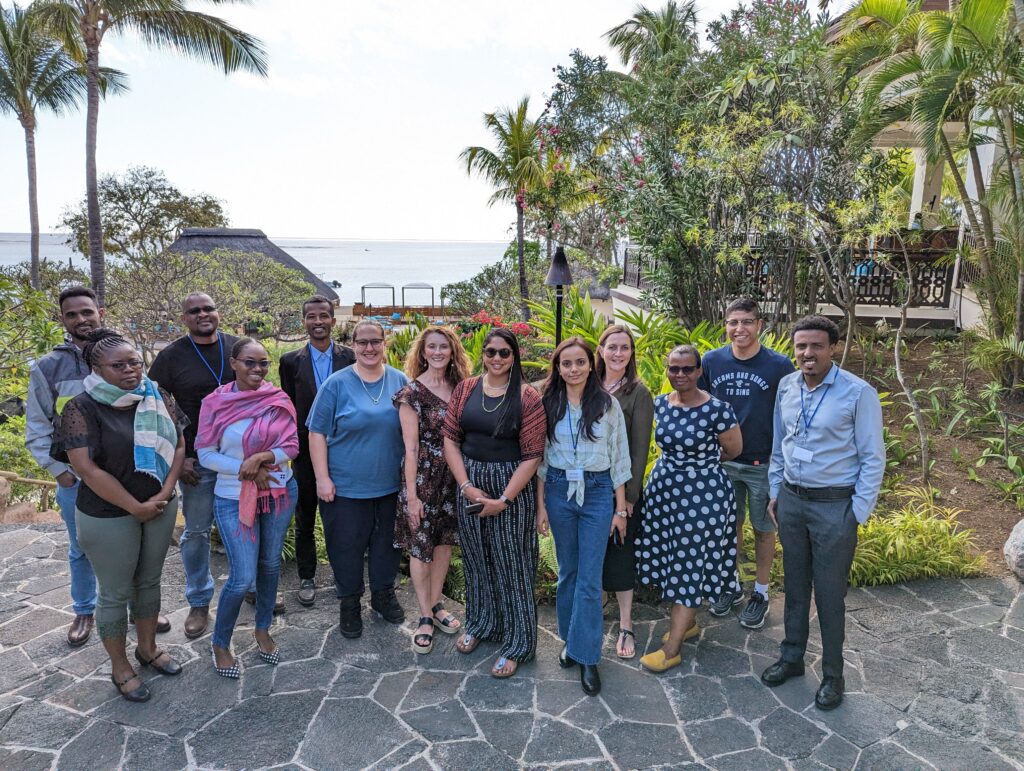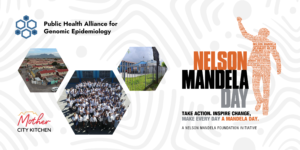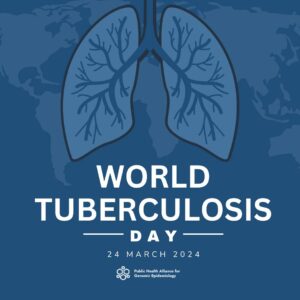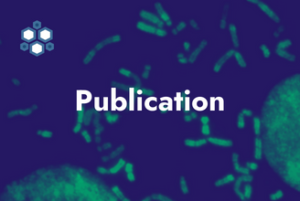
The PHA4GE Ethics and Data Sharing Working Group has a mandate to improve the practical application of ethical principles to research and data sharing. Through a competitive selection process, four sub-awards from the Ethics and Data Sharing Working Group were granted to researchers in Botswana, Ethiopia, Nepal, and South Africa. Spanning a duration of 18 months, these projects addressed specific challenges to ethics and data-sharing experienced by the awardees in their home research environments.
A dynamic, week-long workshop was the launch of these projects. Here, the teams immersed themselves in a working meeting, collaboratively building outcomes-based Theory of Change models and detailed work plans for each project. Under the expert guidance of facilitators Nicki Tiffin, Michelle Nichol, Vicky Nembaware, and Anja Bedeker, participants were also provided with training in quantitative and qualitative research methods. The workshop provided an excellent starting point to get to get to know each-other and to learn from the different projects, whilst setting up the awardees for success in their respective funded projects.
Botswana
University of Botswana
Sub-Grants Enhancing Ethics and Data Sharing for Public Health: Insights from Botswana
In the dynamic landscape of public health, Botswana stands as a beacon of progress in sub-Saharan Africa, embracing eHealth systems to fortify healthcare delivery and informed decision-making. Despite strides in digital innovation, however, interoperability gaps persist between public and private sectors, with limited infrastructure to manage pathogen and human genomics data. To address these challenges, a comprehensive survey was conducted, scrutinizing eHealth systems across Botswana against the Health Information Systems Interoperability Maturity Model and findable, accessible, interoperable, and reusable (FAIR) guidelines.
Outcomes:
- Mapping the Interoperability Landscape: The survey described Botswana’s eHealth interoperability, shedding light on areas that would benefit from enhancement and integration across sectors, to lay the groundwork for seamless data exchange and collaboration and contribute to optimizing healthcare outcomes.
- Ethical Data-Sharing Compliance: An examination of health information systems assessed their adherence to ethical data-sharing principles. By benchmarking against established guidelines, gaps were identified and addressed, to encourage a culture of responsible data stewardship and privacy protection.
- Community Perspectives: Delving deeper, insights into public and scientific community attitudes towards health data sharing were gleaned, and will inform inclusive, transparent frameworks, bridging the gap between stakeholders and fostering trust in data-driven healthcare initiatives.
- Framework for Evidence-Based Healthcare: Synthesizing findings, a robust health data-sharing framework emerged, tailored to Botswana’s unique context. Rooted in evidence and guided by ethical imperatives, this framework empowers decision-makers with actionable insights, driving the trajectory towards equitable, data-informed healthcare delivery.
This project aimed to move beyond assessment and to act as a catalyst for change in Botswana’s healthcare ecosystem. Through collaboration, innovation, and a steadfast commitment to ethical principles, the journey towards a healthier, more resilient future begins—one shared dataset at a time.
Ethiopia
Wollega University Institute of Health Sciences Department of Public Health
Sub-Grants Enhancing Ethics and Data Sharing for Public Health: Insights from Ethiopia
In Ethiopia, this project aimed to investigate the ethical complexities of public health research in conflict-affected regions. The project employed a blend of qualitative and quantitative methodologies to explore ethical practices for healthcare research in areas grappling with conflict, through in-depth interviews with key stakeholders, including researchers and healthcare providers. Quantitative assessments focused on compliance with ethical standards within three pivotal districts in Western Ethiopia: Jimma Arjo, Leka Dulecha, and Wayu Tuka, Ethiopia. The validity of consent-seeking processes was rigorously evaluated among a cohort of 338 adult participants who had previously engaged in epidemiological studies. Using a customized survey tool derived from international ethics guidelines, researchers assessed the information relayed during the consenting process, gauged participants’ comprehension levels, and assessed the voluntarism underpinning their research involvement.
This study provides insights into the ethical challenges of conducting health research in conflict-ridden environments and also underscores the importance of upholding ethical standards in order to safeguard the rights and well-being of research participants. This study provides important information for building resilient healthcare research in conflict zones, and to guiding future endeavours towards ethically informed and equitable health research practices. A research article on this study can be found here.
Nepal
Kathmandu Research Institute for Biological Sciences
Sub-Grants Enhancing Ethics and Data Sharing for Public Health: Insights from Nepal
This research initiative aimed to address health research challenges in Nepal exacerbated by limited infrastructure and financial resources. Non-Nepalese health science researchers doing short-term research projects in Nepal provide financial support for research, but their involvement also raises concerns about how the research data are subsequently used and managed. The project’s primary goal was to develop comprehensive guidelines for the ethical and equitable use of health research data generated in Nepal. Utilizing a participatory approach, stakeholders actively engaged in multinational health research within Nepal contributed to this endeavour.
Key Findings and Recommendations:
1. Critical challenges surrounding health research data transfer in Nepal were identified, including the absence of standardized guidelines, limited awareness, data sharing issues, and complexities associated with biological sample transfer.
2. Recommendations include establishing a national data-sharing platform, preferably government-led, to ensure data protection and accessibility. Additionally, the creation of centralized data repositories within research institutions or government bodies is advised to safeguard intellectual property rights.
3. Emphasis is placed on standardized data sharing to enhance security and accessibility, with attention to intellectual property rights and the role of centralized data repositories.
4. Legal measures, clear agreements, and dedicated oversight are proposed to maintain data integrity and security, crucial for upholding ethical standards.
5. Recommendations for streamlining biological sample transfer processes focus on transparency and advancing scientific research in Nepal.
This project aimed to improve healthcare research in Nepal by addressing ethical dilemmas and providing practical solutions for data sharing and ownership issues. By establishing a framework promoting equitable, responsible and secure data sharing practices, the initiative benefits local and international researchers alike, contributing to the advancement of healthcare research in Nepal.
South Africa
South African National Bioinformatics Institute
Sub-Grants Enhancing Ethics and Data Sharing for Public Health: Insights from South Africa
The project aimed to address the critical need for comprehensive training in research ethics among students and young researchers. With a focus on enhancing ethical behaviour in research, the project undertook the design and implementation of a short course on research ethics. This course, which combined theoretical foundations with practical applications, was piloted with biomedical honours students at the University of the Western Cape. The subsequent evaluation and refinement of the course material aimed to equip participants with a deeper understanding of research ethics and its application to their own work.
Outcomes:
The findings underscored a significant gap in the training of students and young researchers regarding research ethics. Many participants exhibited limited knowledge of the ethical dimensions inherent in their research projects. Upon engaging with the course material and gaining insights into the principles of research ethics, however, a transformative shift in their perspectives was observed. Participants began to grasp the critical importance of ethics in research endeavours and recognized its relevance to their own work. This evolution in mindset highlights the potential for targeted educational interventions to instil a culture of ethical conduct within the research community.



